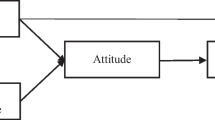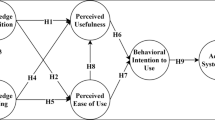Abstract
In this study we applied the technology acceptance model (TAM) to explain users’ acceptance of mobile technology as a medium of knowledge providing. We adjusted the TAM by adding three new constructs: Access to Information, Information Quality, and Information Navigation. The model was tested on a population of 303 respondents using structural equation modeling (SEM). Our findings indicated that information quality and information navigation influence the perceived ease of use and, as a result, perceived usefulness of mobile technology usage that has an impact on the behavioral intention of use and the actual use of these devices. The developed model might comprise the basis for further research in the area of mobile technology usage for knowledge providing.
Access this chapter
Tax calculation will be finalised at checkout
Purchases are for personal use only
Similar content being viewed by others
References
Alderete, M.V.: Mobile broadband: a key enabling technology for entrepreneurship? J. Small Bus. Manag. 55(2), 254–269 (2017)
Alharbi, S., Drew, S.: Using the technology acceptance model in understanding academics’ behavioural intention to use learning management systems. Int. J. Adv. Comput. Sci. Appl. 5(1), 143–155 (2014)
Ally, M., Prieto-Blázquez, J.: What is the future of mobile learning in education? Int. J. Educ. Technol. High. Educ. 11(1), 142–151 (2014)
Anand, P.R., Kumaran, M.: Information seeking behaviour of shrimp farmers and their perception towards technology dissemination through mobile phones. J. Ext. Educ. 29(1), 5787–5796 (2017)
Anderson, J.C., Gerbing, D.W.: Structural equation modeling in practice: a review and recommended two-step approach. Psychol. Bull. 103(3), 411–423 (1988)
Barata, J., Da Cunha, P.R., Stal, J.: Mobile supply chain management in the Industry 4.0 era: an annotated bibliography and guide for future research. J. Enterp. Inf. Manag. 31(1), 173–192 (2018). https://doi.org/10.1108/JEIM-09-2016-0156
Brine, J.: Lifelong learning and the knowledge economy: those that know and those that do not – the discourse of the European Union. Br. Educ. Res. J. 32(5), 649–665 (2006)
Caudill, J.G.: The growth of m-learning and the growth of mobile computing: parallel developments. Int. Rev. Res. Open Distrib. Learn. 8(2), 1–13 (2007)
Davis, F.D.: Perceived usefulness, perceived ease of use, and user acceptance of information technology. MIS Q. 13(3), 319–340 (1989)
Davis, F.D., Bagozzi, R.P., Warshaw, P.R.: User acceptance of computer technology: a comparison of two theoretical models. Manag. Sci. 35(8), 982–1003 (1989)
Davison, C.B., Lazaros, E.J.: Adopting mobile technology in the higher education classroom. J. Technol. Stud. 41(1), 30–39 (2015)
Dearnley, C., et al.: Using mobile technologies for assessment and learning in practice settings: outcomes of five case studies. Int. J. E-Learn. 8(2), 193–207 (2009)
Fathema, N., Shannon, D., Ross, M.: Expanding the Technology Acceptance Model (TAM) to examine faculty use of Learning Management Systems (LMSs) In higher education institutions. J. Online Learn. Teach. 11(2), 210–232 (2015)
Fishbein, M., Ajzen, I.: Belief, Attitude, Intention and Behavior: An Introduction to Theory and Research. Addison-Wesley, Reading (1975)
Foray, D., Lundvall, B.: The knowledge-based economy: from the economics of knowledge to the learning economy. Econ. Impact Knowl. 115–121 (1998)
French, A.M., Guo, C., Shim, J.P.: Current status, issues, and future of Bring Your Own Device (BYOD). Commun. Assoc. Inf. Syst. (CAIS) 35(10), 191–197 (2014)
Hair Jr., J.F., Black, W.C., Babin, B.J., Anderson, R.E., Tatham, R.L.: Multivariate Data Analysis, 6th edn. Prentice-Hall, Upper Saddle River (2006)
Heflin, H., Shewmaker, J., Nguyen, J.: Impact of mobile technology on student attitudes, engagement, and learning. Comput. Educ. 107, 91–99 (2017)
Hussain, I., Adeeb, M.A.: Role of mobile technology in promoting campus-wide learning environment. TOJET: the Turk. Online J. Educ. Technol. 8(3) (2009)
Junglas, I., Abraham, C., Ives, B.: Mobile technology at the frontlines of patient care: understanding fit and human drives in utilization decisions and performance. Decis. Support Syst. 46(3), 634–647 (2009)
Kaske, D., Mvena, Z.S.K., Sife, A.S.: Mobile phone usage for accessing agricultural information in Southern Ethiopia. J. Agric. Food Inf. 1–15 (2017). https://doi.org/10.1080/10496505.2017.1371023
Kuciapski, M.: A model of mobile technologies acceptance for knowledge transfer by employees. J. Knowl. Manag. 21(5), 1053–1076 (2017)
Lundvall, B.A., et al.: The New Knowledge Economy in Europe: A Strategy for International Competitiveness and Social Cohesion. Edward Elgar Publishing, Glos (2002)
Marangunić, N., Granić, A.: Technology acceptance model: a literature review from 1986 to 2013. Univ. Access Inf. Soc. 14(1), 81–95 (2015)
Martin, F., Ertzberger, J.: Here and now mobile learning: an experimental study on the use of mobile technology. Comput. Educ. 68, 76–85 (2013)
Nicholas, D., Clark, D., Rowlands, I., Jamali, H.R.: Information on the go: a case study of Europeana mobile users. J. Assoc. Inf. Sci. Technol. 64(7), 1311–1322 (2013)
Nord, J.H., Koohang, A., Paliszkiewicz, J.: A report on the state of mobile technologies within organizations. Issues Inf. Syst. 17(1), 70–79 (2016)
Núñez, D., Ferrada, X., Neyem, A., Serpell, A., Sepúlveda, M.: A user-centered mobile cloud computing platform for improving knowledge management in small-to-medium enterprises in the Chilean construction industry. Appl. Sci. 8(4), 516 (2018)
Owczarek, M.: Analiza cen usług mobilnego dostępu do Internetu w Polsce. Urząd Komunikacji Elektronicznej, Warszawa (2018)
Portela, F., da Veiga, A.M., Santos, M.F.: Benefits of bring your own device in healthcare. In: Machado, J., Abelha, A., Santos, M.F., Portela, F. (eds.) Next-Generation Mobile and Pervasive Healthcare Solutions, pp. 32–45. IGI Global, Hershey (2018)
Prusak, L.: Knowledge in Organisations. Routledge, Abingdon (2009)
Román, S., Rodríguez, R., Jaramillo, J.F.: Are mobile devices a blessing or a curse? Effects of mobile technology use on salesperson role stress and job satisfaction. J. Bus. Ind. Mark. 33(5), 651–664 (2018)
Rowles, D.: Mobile Marketing: How Mobile Technology is Revolutionizing Marketing, Communications and Advertising. Kogan Page Publishers, London (2017)
Roy, D.: Success factors of adoption of mobile applications in rural india: effect of service characteristics on conceptual model. In: Green Computing Strategies for Competitive Advantage and Business Sustainability, pp. 211–238. IGI Global, Hershey (2018)
Sekaran, U., Bougie, R.: Research Methods for Business: A Skill Building Approach. Wiley, Hoboken (2016)
Stal, J., Paliwoda-Pękosz, G.: Mobile technology in knowledge acquisition: a preliminary study. In: Ulman, P., Węgrzyn, R., Wójtowicz, P. (eds.) Knowledge, Economy, Society: Challenges and Tools of Modern Finance and Information Technology, pp. 123–132. Cracow, Poland (2017)
Stal, J., Paliwoda-Pękosz, G.: Towards Integration of mobile technology and knowledge management in organizations: a preliminary study. In: Kowal, J. et al. (eds.) Innovations for Human Development in Transition Economies. Proceedings of the International Conference on ICT Management for Global Competitiveness and Economic Growth in Emerging Economies, Wrocław, Poland, pp. 204–214 (2017)
Stal, J., Paliwoda-Pękosz, G.: Why M-learning might appeal to organisations? In: Themistocleous, M., Morabito, V., Ghoneim, A. (eds.) Proceedings of the 13th European, Mediterranean & Middle Eastern Conference on Information Systems, pp. 139–148. Cracow University of Economics, Kraków (2016)
Stal, J.: Data personalization in mobile environment: the content adaptation problem. In: Tvrdíková, M., Ministr, J., Rozehnal, P. (eds.). Proceedings of the 14th International Conference on Information Technology for Practice, pp. 181–188. Technical University of Ostrava (2011)
Stal, J.: Information and application management: implications for mobile business development. Int. J. Strateg. Manag. Decis. Support Syst. Strateg. Manag. 15(4), 43–52 (2010)
Wu, J.H., Wang, S.C.: What drives mobile commerce?: an empirical evaluation of the revised technology acceptance model. Inf. Manag. 42(5), 719–729 (2005)
Yousafzai, S.Y., Foxall, G.R., Pallister, J.G.: Technology acceptance: a meta-analysis of the TAM: Part 1. J. Model. Manag. 2(3), 251–280 (2007)
Author information
Authors and Affiliations
Corresponding author
Editor information
Editors and Affiliations
Ethics declarations
Funding
This research has been financed by the funds granted to the Faculty of Management, Cracow University of Economics, Poland, within the subsidy for maintaining research potential.
Appendix
Appendix
Measurement items in the Survey Questionnaire
Constructs (latent variables) | Measurement items | Questions |
|---|---|---|
Access to Information (AI) | AI1 | In my opinion, the speed of mobile Internet is satisfactory |
AI2 | In my opinion, the availability of mobile Internet is satisfactory | |
AI3 | In my opinion, the access cost to the mobile Internet is satisfactory | |
Information Quality (IQ) | IQ1 | I think that content intended for smartphones is optimized for their correct display |
IQ2 | I think that content displayed on smartphones is tailored to the expectations of a mobile user | |
IQ3 | I think that it is possible to effectively present any type of content on a smartphone | |
Perceived Ease of Use (PEOU) | PEOU1 | I think that it’s easy to use a smartphone |
PEOU2 | I think it would be easy for me to use a smartphone to get information | |
PEOU3 | In general, I think that using a smartphone to get information would be easy | |
Information Navigation (IN) | IN1 | I think that small dimensions of a smartphone do not constitute an obstacle to effective navigation of the displayed information |
IN2 | I think that the lack of a traditional keyboard or mouse is not an obstacle to effective navigation of the presented information | |
IN3 | In general, I think that the technical parameters of a smartphone should not be an obstacle to getting acquainted with the presented content | |
Perceived Usefulness (PU) | PU1 | I believe that using a smartphone to obtain information can speed up the implementation of tasks |
PU2 | I believe that using a smartphone to obtain information can improve my work efficiency | |
PU3 | In general, I think that using a smartphone to get information can be useful in my work | |
Behavioral Intention (BI) | BI1 | I intend to use a smartphone to retrieve information in the future |
BI2 | I intend to use a smartphone to get information as often as possible | |
BI3 | I intend to use a smartphone to obtain information to support my work | |
Actual Use (AU) | AU1 | I used a smartphone to get information during the last week |
AU2 | I used a smartphone to get information during the last month | |
AU3 | In general, I use a smartphone to get information |
Rights and permissions
Copyright information
© 2019 Springer Nature Switzerland AG
About this paper
Cite this paper
Stal, J., Paliwoda-Pękosz, G. (2019). Mobile Technology Acceptance Model: An Empirical Study on Users’ Acceptance and Usage of Mobile Technology for Knowledge Providing. In: Themistocleous, M., Rupino da Cunha, P. (eds) Information Systems. EMCIS 2018. Lecture Notes in Business Information Processing, vol 341. Springer, Cham. https://doi.org/10.1007/978-3-030-11395-7_42
Download citation
DOI: https://doi.org/10.1007/978-3-030-11395-7_42
Published:
Publisher Name: Springer, Cham
Print ISBN: 978-3-030-11394-0
Online ISBN: 978-3-030-11395-7
eBook Packages: Computer ScienceComputer Science (R0)




